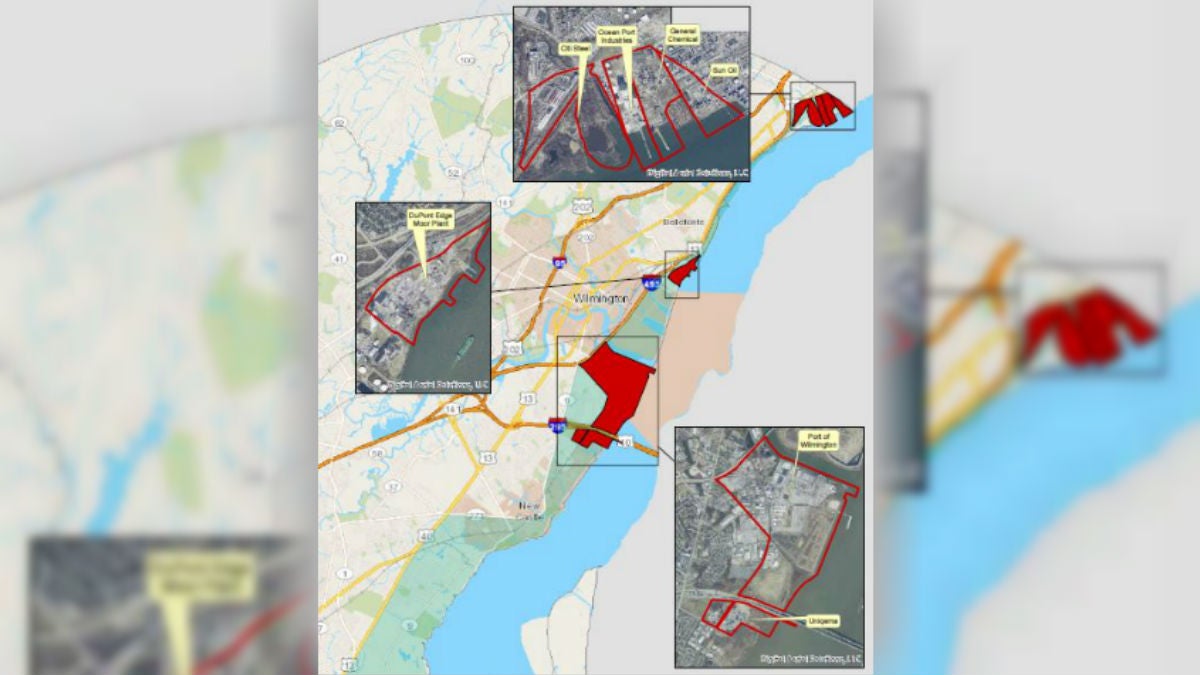Delaware lawmakers propose changes to Coastal Zone Act

A maps shows several industrial sites in New Castle County that were grandfathered in under the CZA. (photo courtesy Delaware House Democrats)
Some Delaware state lawmakers have introduced a bill that would make changes to the Coastal Zone Act.
House Bill 190 calls for an update to the Coastal Zone Act (CZA), enacted in 1971 to preserve and protect Delaware’s coastline from heavy industry and manufacturing. But the law, as it’s written, limits opportunities to repurpose existing sites of heavy industry, according to the bill.
The CZA allowed property that had been in use by heavy industry pre-1971 to continue, in spite of being located within the coastal zone. Those 14 grandfathered sites, many of which are now shuttered or underused, “go unused unless the owner is willing to engage in the same heavy industry use or to use the property for manufacturing,” the bill stated.
The bipartisan bill is sponsored by Rep. Ed Osienski and Sen. Bryan Townsend. It would establish a process for interested parties to potentially redevelop a limited number of abandoned heavy-industry sites for industrial use.
Specifically, the measure would give the Secretary of the Department of Natural Resources and Environmental Control the power to issue a “conversion permit,” allowing the owner, operator or prospective purchaser of a grandfathered site to operate an alternative or additional heavy industry use at the site.
The bill would only allow conversion permits for those 14 specific sites.
“I am someone who enjoys our coastal areas regularly, and want to make sure our natural resources are protected. At the same time, we have to balance that protection against the economic viability and future of our state, said Osienski, D-Newark, the bill’s prime sponsor. “The majority of the abandoned sites that our bill would address are still polluted.”
Under HB 190, an interested company would need to clean the brownfield and remove pollution from the site. Interested parties must also submit a written application requiring all of the information currently required for a permit under the CZA, in addition to things like the net environmental and economic improvement of the alternative or additional heavy industry use of the site and a sea-level rise plan.
Oil refineries, basic cellulose pulp paper mills and incinerators would continue to be forbidden, as they have been since the CZA was enacted 46 years ago.
“Our bill would set a high bar for planning, remediation and regulatory control,” Osienski said.
“This legislation attempts to ensure the proper balance between environmental protection and economic growth,” said Townsend, the prime Senate sponsor from Newark. “If we are able to convert some of these abandoned brownfields into active industries, these sites could employ hundreds, even thousands, of Delawareans, offering good-paying jobs that could become careers for many. The process of remediating and building up an industry would mean more environmental cleaning and construction jobs. An active industry would contribute personal income taxes, corporate income taxes, and property taxes to our local school districts once again.”
All conversion permit applications under the act are subject to a public hearing.
Gov. John Carney alluded to an update to the CZA when he addressed a joint session of the General Assembly in March. At the time, Carney said he wanted to “modernize” the CZA.
“I believe we can make reasonable changes to this law that will protect our environment while allowing our economy to grow,” Carney, D-Delaware, said.
“There’s no question the 1971 Coastal Zone Act was a landmark piece of environmental legislation, but the unintended consequence has become abandoned, polluted sites that were always anticipated to be in operation – regulated, clean, remediated, but in operation. This legislation makes the prospect for economic growth a reality again, while preserving the vast majority of our treasured coastline for future generations,” Townsend said.
HB 190 has been assigned to the House Natural Resources Committee.
WHYY is your source for fact-based, in-depth journalism and information. As a nonprofit organization, we rely on financial support from readers like you. Please give today.


